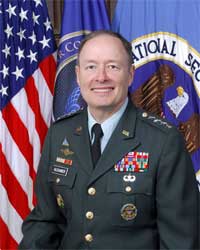 KINGSTON, R.I. — March 30, 2011 — The world’s leading authorities on computer network security will join other experts and political leaders at the University of Rhode Island’s Cybersecurity Symposium next month. Four-star General Keith Alexander, Director of the National Security Agency; Douglas Maughan, Director of the Department of Homeland Security’s Cyber Security Division; Peiter “Mudge” Zatko, Defense Advanced Research Projects Agency manager; and Jeffrey Troy, the FBI’s Cyber Division Deputy Assistant Director are a few of the featured speakers.
KINGSTON, R.I. — March 30, 2011 — The world’s leading authorities on computer network security will join other experts and political leaders at the University of Rhode Island’s Cybersecurity Symposium next month. Four-star General Keith Alexander, Director of the National Security Agency; Douglas Maughan, Director of the Department of Homeland Security’s Cyber Security Division; Peiter “Mudge” Zatko, Defense Advanced Research Projects Agency manager; and Jeffrey Troy, the FBI’s Cyber Division Deputy Assistant Director are a few of the featured speakers.
These leaders will participate in symposium panel discussions about Digital Forensics, Critical Infrastructure, and Network Security and Trust. The symposium will be held on Monday, April 11 from 10 a.m. to 4:30 p.m. at the Robert L. Carothers Library and Learning Commons on the Kingston Campus. The event is free and open to the public, but registration is required at http://cybersecurity2011.uri.edu.
U.S. Rep. James Langevin commissioned the University to host this symposium to raise awareness of the need to counter threats and improve the safety of cyber networks in Rhode Island and around the globe. A member of the U.S. House Armed Services committee and as co-chair of the Cybersecurity Caucus, protecting our national and economic security from cyber threats is one of Rep. Langevin’s top priorities. He and Sen. Sheldon Whitehouse will speak at the symposium.
America’s most senior cyber warrior, Gen. Alexander, will be the keynote speaker at 10:30 a.m. Alexander is the commander of the U.S. Cyber Command and Director of the National Security Agency/Chief, Central Security Service. As commander, he is responsible for operations and defense of Department of Defense (DOD) computer networks and as the director he is responsible for the DOD agency with national foreign intelligence, combat support, and U.S. national security information system protection.
Those unable to attend the lecture can watch it live online URI Live! 
In recent testimony before a House Armed Services Committee subcommittee, Alexander outlined the command’s need to build its workforce, launch efforts with industry and work with international partners to provide connectivity and safeguard worldwide information networks. “People are the big thing” at Cybercom and “for our future investing in people is key,” Alexander told legislators.
To address what President Barack Obama has described as “one of the most serious economic and national security threats our nation faces” the symposium will cover some of the most important issues and explain how the University is working to help secure the information infrastructures in use by government, private companies, nonprofits and academia.
Throughout the panel discussions URI doctoral candidates will present their related research and graduate and undergraduate students will present cybersecurity posters.
URI President David M. Dooley, Rep. Langevin, Sen. Sheldon Whitehouse, and Vice President for Research and Economic Development Peter Alfonso will open the symposium and welcome the speakers and guests at 10 a.m. Opening remarks will be followed by the panel discussions as described below (complete agenda with all speakers and biographies is available at http://cybersecurity2011.uri.edu).
Cyber Threats to Critical Infrastructure, 11 a.m.
• Douglas Maughan, Director of the Cyber Security Division, Department of Homeland Security where he directs cybersecurity research, development, testing, and evaluation to secure the nation’s current and future critical cyber infrastructure
• Theresa Murray, Regional Catastrophic Planner, Rhode Island Emergency Management Agency
• Yan Sun, Associate Professor, URI Department of Electrical, Computer, and Biomedical Engineering
Cybersecurity: Cyber Forensics, 1 p.m.
• Jeffrey Troy, the FBI’s Deputy Assistant Director, Cyber Division. Troy is known for leading thorough investigations for resolution of high profile international cyber crimes.
• Daniel Dickerman, Special Agent, US Internal Revenue Service Criminal Investigation Electronic Crimes Program
• Alan White, Director of Network Security and Risk Consulting for North America, Dell/Secure Works Inc.
• Victor Fay-Wolfe, Professor, URI Department of Computer Science and Statistics.
Network Security and Trust, 2:45 p.m.
• “Mudge”, Peiter Zatko, Program Manager for Defense Advanced Research Projects Agency’s Information Innovation Office. Zatko is best known as a member of Lopht Heavy Industries, the hacker think tank that in 1998 warned Congress of security breaches that could shut down the entire Internet in just minutes.
• Marcus Sachs, Verizon Vice President for National Security Policy Development and Advocacy. Sachs focuses on issues ranging from critical infrastructure asset protection to emergency preparedness for the telecom giant.
• Lisa DiPippo, URI Computer Science and Statistics associate professor
• Yan Sun, Associate Professor, URI Department of Electrical, Computer, and Biomedical Engineering
Remarks, 4 p.m.
• Arthur W. Coviello, Jr., Executive Vice President, EMC Corporation & Executive Chairman, RSA, The Security Division of EMC
Closing remarks, 4:20 p.m.
• Representative James Langevin, On March 16, Rep. Langevin introduced the “Executive Cyberspace Coordination Act” that among other things would “support educational programs designed to engage students in the skill sets that they will need to keep our country competitive and safe online into the future.”
URI is one of few academic institutions to provide research, teaching, training, services, and consulting in issues involving digital data discovery, recovery, and analysis. URI’s Digital Forensics Center, directed by Computer Science Professor Victor Fay-Wolfe, offers several undergraduate, graduate and professional level degree and certificate options specializing in the field. All of these programs involve students in education, practicum and research to create a workforce of computer science graduates trained in computer forensics.
Pictured above
General Keith Alexander

